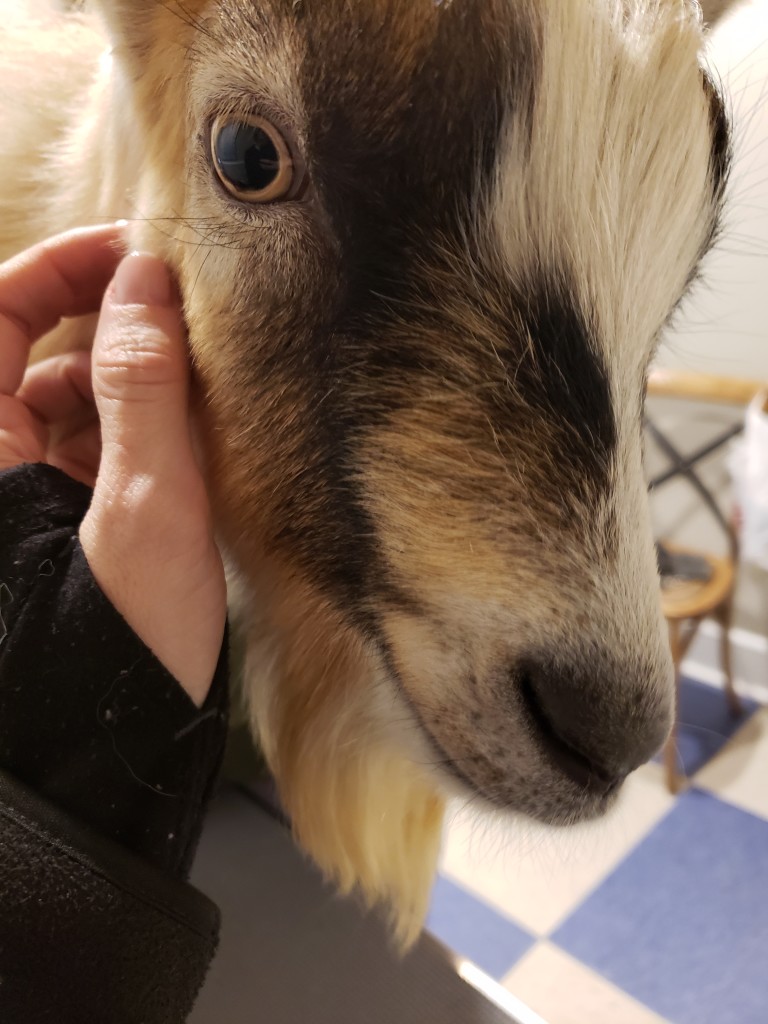Last week I went out to feed the animals and my buck, Chauncey, pranced up to me crying. This in itself isn’t abnormal. He always gets excited about feeding time. At first I giggled because his antics were more over the top than usual.
He continued this behavior, prancing alongside me as I made my way to the barn. I paused to watch him for a few seconds and noticed he was blinking profusely and straining. His head would go down towards the ground and cock to one side. It appeared that he had little control over his own body – similar to a seizure.
The behavior continued even after he ate his dinner which he didn’t eat as voraciously as usual. Then I noticed he went to stand in the corner and couldn’t relax. None of the does exhibited this behavior and yet, each one seemed concerned over Chauncey, especially Maybelle, who is always very sensitive to others, even people. This is what makes her an excellent therapy goat.
I watched him stand in the corner where periodically his eyes would bug out a bit and he would blink repeatedly, tense up and cry. It was heartbreaking to see.
I suspected polio. I’d heard of goat polio but never experienced it in my herd. There are several causes of this – moldy foods seem to the be primary cause – but there was nothing I could find that was moldy and his hay was fresh. Of course, this is the south, and winter time tends to be our rainy season. With free range of my property he could have gotten into anything. Another trigger for goat polio is extreme weather changes – again – very common with southern winters. Bingo – overnight the temps had fallen drastically.
Generally, goat polio can be arrested with b vitamins if it’s caught early enough, otherwise it can be a death sentence. So of course, I was out of goat b vitamins. I raced to my kitchen and found a bottle of b complex tablets. He was still eating a bit so I was able to hide a tablet inside a treat, which he nibbled at and somehow ate the entire tablet. Thank goodness. This was a Sunday night and farm vets around here are virtually non existant for house calls.
I left Chauney in the barn with Maybelle closely guarding him and barely slept from worry and checking on him. By morning he seemed to have a little more control over his body but was still exhibiting the same, although diminished, symptoms and he seemed exhausted. The b vitamin tablet seemed to have bought us time though.
By now, I felt confident in what I was dealing with but contacted a new vet in town who has goats of her own (huge bonus). Over the phone she also thought it sounded like polio. Once I got him to the vet she confirmed our suspicions. Polio. And fortunately, the little amount of B complex he ingested helped overnight. With a B vitamin IV shot and lots of affection, we left the vet, praying for recovery. Even after the 20 minute drive home Chauncey already seemed better. By the next morning there were zero signs of the disease. Thank you, Dr. Leflore! And a week and a half later, he’s still doing well.
The lesson here is – always have goat B vitamins on hand and know your animal’s natural behaviors. Fortunately, this precious little buck looks like he will get to see his newborn kids next month.

If you’ve experienced polio in your herd I’d love to hear what symptoms and causes you’ve seen.
xo






